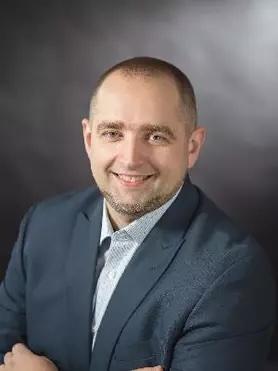Studying Science Scientifically Speaker Series: Maksim Kitsak

Maksim Kitsak will present, "Modeling and Inference of Complementarity Mechanisms in Networks."
Maksim Kitsak is an Associate Professor of the Electrical Engineering, Mathematics, and Computer Science faculty of the Delft University of Technology, the Netherlands. Prof. Kitsak has been working at the intersection of Network Theory, Machine Learning, and Statistical Physics. Prof. Kitsak is particularly interested in the fundamental principles behind non-Euclidean network embeddings and novel applications of network embeddings in communication and biological networks. His research is often published in prestigious journals, such as Nature and Science Families. Prof. Kitsak gratefully acknowledges the financial support of the National Science Foundation (NSF, USA), Army Research Office (ARO, USA), and the Dutch Research Council (NWO, NL).
Abstract:
In many networks, including networks of protein-protein interactions, interdisciplinary collaboration networks, and semantic networks, connections are established between nodes with complementary rather than similar properties. What is complementarity?
The Oxford Dictionary asserts that "two people or things that are complementary are different but together form a useful or attractive combination of skills, qualities or physical features." Sadly, our understanding of complementarity in networks does not
go far beyond definition. While complementarity is abundant in networks, we lack mathematical intuition and quantitative methods to study complementarity mechanisms in these systems. Instead, we routinely retreat to using available off-the-shelf methods developed in the first place for similarity-driven networks.
In my talk, I will discuss my group's recent achievements in the analysis of complementarity mechanisms in networks. I will first explain why existing similarity-based inference and learning methods are not readily applicable to systems where complementarity between interacting nodes plays a significant role. I will then deduce, starting with the definition by the Oxford Dictionary, a general complementarity framework for networks capable of describing any matching relations and containing both similarity and antitheses relations as special cases. Using the general framework, I will formulate a minimal null model to learn complementarity embeddings of real networks via maximum-likelihood estimation. I will demonstrate how complementarity embeddings can be used to infer both complementary and similar nodes in a network, enabling network inference tasks, such as link prediction and community detection. Armed with the new intuition and methods, I will examine collaboration patterns in co-authorship networks of different disciplines, demonstrating that both similarity and complementarity principles are at play there, albeit in varying proportions. I will conclude my talk with an outlook on the interplay of similarity and complementarity in the formation of networks, arguing for for a careful re-evaluation of existing similarity-inspired methods.
About the speaker series:
The CIRSS Friday Speaker Series continues in Fall with a new theme of "Studying Science Scientifically: State of the Art and Prospects for the Science of Science.” With increasingly rich data sources, exciting new technologies for understanding natural language, and modeling methodologies adapted from diverse domains of scholarship, the opportunities to observe, measure, and model the structure and dynamics of the scientific enterprise abound as never before. We are inviting some of the leading thinkers and most innovative researchers to present at this talk series to illustrate the breadth of advances that have been made, and the many more yet to be made.
We meet most Fridays, 11am-noon Central time, on Zoom. Everyone is welcome to attend. More information, including upcoming speaker schedule and links to recordings, is available on the series website. For weekly updates on upcoming talks, subscribe to our CIRSS Seminars mailing list. Our Fall series is led by Timothy McPhillips and Yuanxi Fu, and supported by the Center for Informatics Research in Science and Scholarship (CIRSS) and the School of Information Sciences at the University of Illinois at Urbana-Champaign.
This event is sponsored by Center for Informatics Research in Science and Scholarship